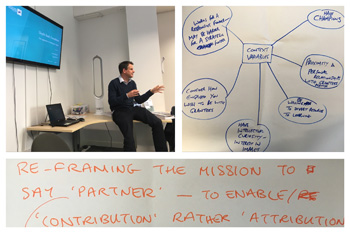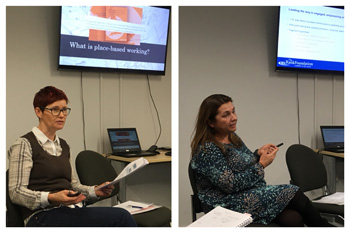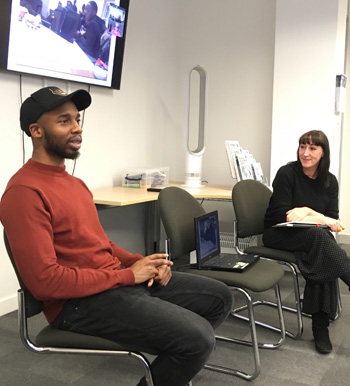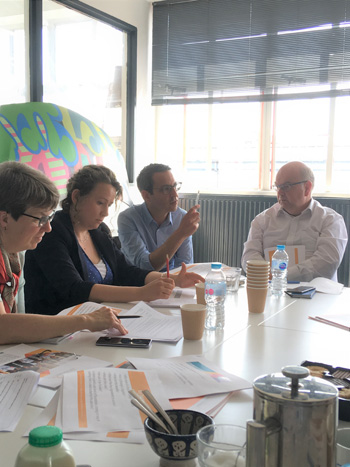Impact and learning
Impact and Learning working group was one of the six underpinning the Stronger Foundations initiative. Its principal purpose was to examine, discuss and debate challenging questions about foundation practice related to its theme. The group has now concluded meetings and its report will be published shortly.
The full report is available to view and download.
On this page you can find snapshots of each meeting, including content, reading materials and outputs. The group's work contributed significantly to the raw material gathered through the initiative as a whole, from which ACF will create a variety of products, including a 'rapporteur's report' summarising the breadth of discussions and evidence gathered.
The group is comprised of senior foundation representatives drawn from across ACF's membership, who will meet 7 times over an 18 month period. The meetings, which varied in format depending on the topic and desired content, included presentation of evidence (by experts from within and beyond the foundation sector), small group discussions, whole group exercises and visits.
The group's full terms of reference is available to view and download.
The members of the group were: Maria Ali-Adib Pravda and Marieke Bosman, Asfari Foundation; Gina Crane, Esmée Fairbairn Foundation; Jan Doole, Tuixen Foundation; Jemma-Grieve Combes, City Bridge Trust; Sara Harrity, A B Charitable Trust; Louisa Hooper, Calouse Gulbenkian Foundation; Jayne Humm, Local Trust; Helen Kersley, Cripplegate Foundation; Sharon Mullarkey and Caroline Broadhurst, Rank Foundation; James Murray, Ormiston Trust; Duncan Shrubsole, Lloyds Bank Foundation for England and Wales; Jane Steele, Paul Hamlyn Foundation (group chair); Laura Wirtz, St. Martin’s in the Fields
Meeting Snapshots
Meeting #1 (July 2018) - introductory session
ACF has hosted the first meeting of the Impact and Learning working group, chaired by Jane Steele, Director of Evidence and Learning at Paul Hamlyn Foundation. The group discussed what impact and learning means for foundations, why they are important pursuits, and features of current practice. The group identified that, in a foundation context, impact and learning are closely linked, but distinct, areas of interest.
Over many years, a great deal of evidence has been collected on both, taking account a wide variety of interpretations.
Impact is often interpreted as how foundations:
- achieve impact with their resources to achieve their own mission;
- support the missions of others;
- measure the impact of the allocation of resources.
Learning is often understood as how foundations:
- learn about the impact their resources have made (in terms of the impact individual grants, the collective impact of a programme or portfolio of funding, and the impact of their own activities and processes);
- fund learning activities (e.g. research) and use external sources of evidence;
- are informed by their grantees, partners and communities they support in order to do so more effectively; and
- apply this learning to inform, review and revise their strategy and grant processes.
Meeting #2 (September 2018) - Achieving impact in pursuit of mission
 This session explored ways in which foundations seek to achieve impact in pursuit of their own missions, drawing upon an in-depth case study of Lloyds Bank Foundation for England and Wales (LBFEW). Duncan Shrubsole, its director of policy, communications and research, gave an overview of the process by which it learned from its previous strategy in order to develop its new one (with an underpinning aim of "we fund, we develop, we influence").
This session explored ways in which foundations seek to achieve impact in pursuit of their own missions, drawing upon an in-depth case study of Lloyds Bank Foundation for England and Wales (LBFEW). Duncan Shrubsole, its director of policy, communications and research, gave an overview of the process by which it learned from its previous strategy in order to develop its new one (with an underpinning aim of "we fund, we develop, we influence").
He described the changes the foundation made as a result in conceptualising its work and in its practical application with a mission "to partner with small and local charities to help people overcome complex social issues and rebuild their lives".
This included a move towards longer-term grants and more flexible, unrestricted funding of small, local charities, as well as proactive and targeted research projects.
Duncan also described how in order to become a 'learning foundation' it was essential to ensure that staff at all levels had licence to contribute to the process of developing the new strategy. He also summarised the many ways that the foundation seeks to deliver excellent 'customer service' , one aspect of which is to enable grantees and unsuccessful applicants to provide honest feedback about its processes.
The group then considered the transferable and non-transferable elements of LBFEW's approach to other foundation contexts, and the extent to which there were aspects that could be applied universally regardless of a foundation's particular remit and resources.
Meeting #3 (December 2018) - Impact in a place

At this meeting, the group examined foundations that focus their effort by place (e.g. to achieve a mission to support the development, resilience, culture or wellbeing of people in a specific geographical location), and how a range of conditions may have a bearing on the impact of a foundation (or group of foundations in collaboration) working in this way.
To inform the discussions, we heard from Dr Catherine Walker (pictured left) about her
new research on place-based giving for the Department of Digital, Culture, Media and Sport (DCMS), published in September. She provided an overview of policy and practice in foundation place-based funding, highlighting the wide variety of ways that this concept has been defined and implemented. In her report, place-based giving initiatives are defined as:
"schemes that involve bringing together resources to benefit the community in a collaborative way in a defined geographic location with the intention of tackling local issues in a new way."
The group also heard from Caroline Broadhurst, Deputy CEO at the Rank Foundation (pictured right), who offered an in-depth case study of the Foundation’s approach to place-based grant-making and its impact, and its
multi-year investment in Hull.
The group discussed some of the main implications for place-based giving for foundations, including the importance of a track record, a legitimacy with the community, the need for patience, preparation and tolerance for risk, and the moral responsibility for funders to put things right if things go wrong.
Speaker Snapshot: Dr Cat Walker
Meeting #4 (March 2019) - Grantee feedback: do we really want to know?
 At the fourth meeting, the working group considered the question: grantee feedback: do we really want to know? To stimulate discussion, Anne-Marie Douglas and Kenny Imafidon from Peer Power presented their approach to engaging young people who have been impacted by adverse childhood experiences. Anne-Marie, who founded Peer Power in 2016, emphasised the importance of enabling young people to come up with their own priorities and interests, and involving them in the decisions that affect them.
At the fourth meeting, the working group considered the question: grantee feedback: do we really want to know? To stimulate discussion, Anne-Marie Douglas and Kenny Imafidon from Peer Power presented their approach to engaging young people who have been impacted by adverse childhood experiences. Anne-Marie, who founded Peer Power in 2016, emphasised the importance of enabling young people to come up with their own priorities and interests, and involving them in the decisions that affect them.
Kenny Imafidon, who sits on Peer Power’s advisory board, had five key messages for foundations based on his experience of working with grant-makers and grant-seekers. These were:
- Be aware of the power imbalance.
- Practise what you preach.
- Facilitate a place for learning.
- Offer more than money.
- Foster collaboration.
Jane Steele, chair of the working group, then fed in her experience of how Paul Hamlyn Foundation has been using grantee perception reports carried out by the US-based Center for Effective Philanthropy. Based on this and the points made by Kenny above, the working group discussed what they had heard and applied it to their own contexts.
The group considered the role of trustees in working with grantee feedback, from learning lessons to integrating those views into the board’s composition. Issues of willingness were also surfaced: grantees’ willingness to tell the truth, and foundations’ willingness to listen to and, importantly, act upon feedback received. There were also questions from foundations about their processes, and whether they are conducive to soliciting honest feedback, taking meaningful action, and sharing it with sector colleagues.
Meeting #5 (May 2019) - Strategic litigation
 The fifth meeting of the Impact and Learning working group was kindly hosted by Just For Kids Law, where its CEO Enver Solomon, and Director of Strategic Litigation Jennifer Twite helped the group consider how foundations can use strategic litigation to achieve impact in pursuit of their own mission?
The fifth meeting of the Impact and Learning working group was kindly hosted by Just For Kids Law, where its CEO Enver Solomon, and Director of Strategic Litigation Jennifer Twite helped the group consider how foundations can use strategic litigation to achieve impact in pursuit of their own mission?
Enver and Jennifer examined the benefits of strategic litigation, including its influence on law, policy and guidance and its role in influencing public or media opinion – whether the case is won or lost.
The speakers also discussed the risks, which range from making ‘bad law’ to reputational risks for the organisation. They suggested that foundations are well placed to use strategic litigation as a tool because of their long-term time horizons, their lack of political or market constraints, their ability to take risks, and the wider support they can provide on capacity building or other issues.
Reflecting on what they’d heard, group members considered a number of issues: is there a risk that charities will be seen as antagonistic by working in this way rather than working in partnership with government? Is there a cultural aversion to the use of strategic litigation? Could charities and foundations do more in the current climate that seems ripe for challenge? How might funders encourage organisations to use strategic litigation?
Further discussions surfaced some potential steps that foundations could take, like working with charities to build knowledge of strategic litigation as a tool, using their convening power to foster collaboration, and using their data to identify key issues on which to campaign.
The group also identified some issues for further consideration, for example how strategic litigation fits in with foundations’ wider approaches to campaigning, and whether some foundations or charities might seek to avoid the limelight that comes with strategic litigation.
Blog: "Strategic litigation - a risk worth taking?" , a Stronger Foundations blog written by Max Rutherford, head of policy at ACF.
Meeting #6 (June 2019) - Learning from failure
For its sixth meeting, the Impact and Learning working group consider the topic “Learning from failure”, which kicked off by asking how to define failure. Definitions clustered around the themes of:
- Not achieving expectations
- Outcomes not as expected
- Failing to act on an issue
- Unwanted consequences
- Opportunity to learn lessons
Our external contribution came from Tinne Vandensande from The King Baudouin Foundation in Belgium. Tinne spoke about KBF’s approach to mitigating risk through collaboration and wide use of external experts. She also spoke about the introduction at KBF of the ‘best failure award’ whereby programme teams are asked to put forward applications for this focussed on highlighting the learning from failure. Tinne emphasised that knowing yourself as a foundation is a prerequisite for responsible risk taking.
Reflecting on Tinne’s contribution, the group discussed: how culture is critical as failure can be demoralising; how it is necessary to challenge views of failure if we are to change behaviours; and the types of learning that come out of ‘failures’ and the types of failures themselves.
The group then delved into some more specific questions around embedding a culture of learning, foundations’ risk appetite, personal feelings when things go wrong, and what other risks beyond grants foundations can take in pursuit of mission. Topics that arose included the importance of recording failures, capturing the learning, and speaking openly about things that go wrong.
Meeting #7 (September 2019) - Making the most of foundation independence
For its final meeting, the Impact and Learning working group addressed ‘making the most of foundation independence – funding innovation and taking risks’. The group started by discussing what the word ‘innovation’ means for their foundations. Definitions included, support for new methods and ideas, a higher risk appetite, and the importance of bringing people together in collaboration.
The group was joined by Bettina Crossick, head of third sector and grants programme, Her Majesty’s Prison and Probation Service (HMPPS), who presented on the Ministry of Justice’s Innovation Fund. The programme focuses on supporting new concepts and ways of working so that these can be brought into the mainstream.
Bettina’s presentation generated a lively discussion. Members pointed out that innovation can also occur in wider practice, not solely in funding. For foundations, innovation tends to be incremental and focused on small changes rather than radical innovation. While this is often owing to a fear of risk-taking, these small changes can have a broader impact too.
The group agreed that a broad range of voices and different stakeholders need to bring their thinking together for truly innovative change, though taking account of lived experience was not seen as ‘innovative’ in itself. Communication across the sector is crucial in ensuring an innovative approach hasn’t been seen or done before.
Different foundations have individual roles to play in the wider sector ecosystem, and their ability to innovate will vary depending on their size, resources and experience. Pushing for innovation for the sake of it was recognised as unhelpful. Instead, members stressed that innovation should be appropriately matched to what communities need. In considering what foundations can learn from the Bettina’s case study, the group acknowledged that foundations are not under the same glare and scrutiny as the Ministry of Justice, nor are they constrained by political turbulence and pressure.
This independence allows them to be flexible and take risks.
Further reading
Below you will find a suggested reading list, which the working group identified and considered as part of its deliberations. If you would like to send suggestions to us, please do by emailing Max Rutherford, head of policy at: [email protected]